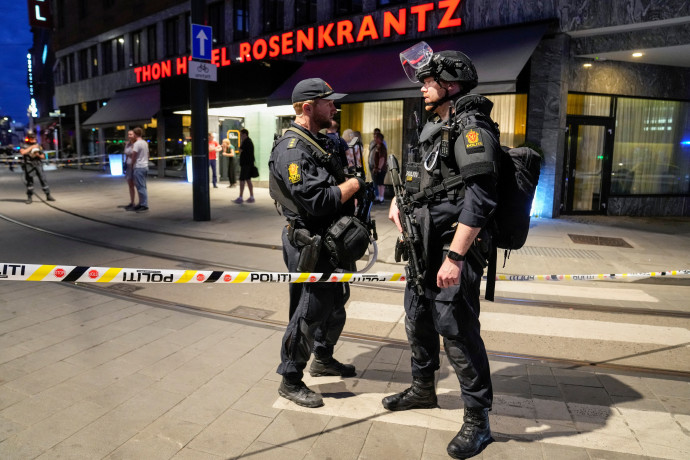A gunman went on a terrifying rampage in a gay bar and the surrounding streets in Oslo on Saturday, killing two people and injuring more than 20 on the day the city's LGBTQ community was due to celebrate its annual Pride parade.
The arrested suspect is believed to be a radicalized Islamist who has a history of mental illness, Norway's PST intelligence service said on Saturday. The suspect, who was not named by police, has been known to security services since 2015, the PST added.
The attack took place in the early hours, with victims shot inside and outside the London Pub, a well-known gay bar and nightclub open since 1979, as well as at one other bar in the center of the Norwegian capital.
"Many people were crying and screaming, the injured were screaming, people were distressed and scared - very, very scared," said Marcus Nybakken, 46, who had left the London Pub shortly before the shooting and returned later to help.
"My first thought was that Pride was the target, so that's frightening."
Journalist Olav Roenneberg of public broadcaster NRK said he was in the area at the time and saw a man arrive with a bag, take out a gun and start to shoot: "Then I saw windows breaking and understood that I had to take cover."

A suspect, a 42-year-old Norwegian citizen of Iranian origin, was detained minutes after embarking on the shooting spree, according to police who said they believed he acted alone. Two weapons, including a fully automatic gun, were retrieved from the crime scene, they added.
"There is reason to think that this may be a hate crime," police said. "We are investigating whether the Pride was a target in itself or whether there are other motives."
They added that the attack was also being investigated as a possible act of terrorism.
Norwegian police, who are not normally armed, will now carry guns until further notice as a precaution, Commander Benedicte Bjoernland said. Norway's PST intelligence service added that it was investigating whether there could be further attacks. "For now we have no indication of that," PST said.
The organizers of Oslo Pride canceled Saturday's parade, citing police advice. "We will soon be proud and visible again, but today we will mark Pride celebrations at home," they said.
King Harald of Norway said he and the royal family were devastated by the attack, which police said also left 10 people seriously wounded and 11 with minor injuries.
"We must stand together and defend our values: freedom, diversity and respect for each other," the 85-year-old monarch added.
"We must stand together and defend our values: freedom, diversity and respect for each other."
King Harald of Norway
The shooting took place just months after Norway marked 50 years since the abolition of a law that criminalized gay sex. The suspect was known to authorities, including for violence of a less severe nature, police said.
The Nordic nation of 5.4 million has lower crime rates than many Western countries, though it has experienced hate-motivated shootings, including when far-right extremist Anders Behring Breivik killed 77 people in 2011.
Anders Breivik mass shooting
Neo-Nazi mass murderer Anders Breivik, who killed eight people with a car bomb in Oslo in July 2011 before shooting dead 69 people at a summer youth camp, had a bid for early release rejected by a Norwegian court.
The court ruled that he has not changed and remains a risk to society.
He was jailed for a maximum 21 years but applied for parole last month.
In its ruling, the court in Telemark in south-east Norway said that it did not trust Breivik's claim that even though his ideology had not changed he would now only promote it through peaceful means.
Although he said he had renounced violence, Breivik gave Nazi salutes on the opening day of the hearing.
Prosecutor Hulda Karlsdottir had argued that the mass killer was still "a very dangerous man". A similar assessment was provided by psychiatrist Randi Rosenqvist, who has assessed Breivik several times and was adamant he could not be trusted.
